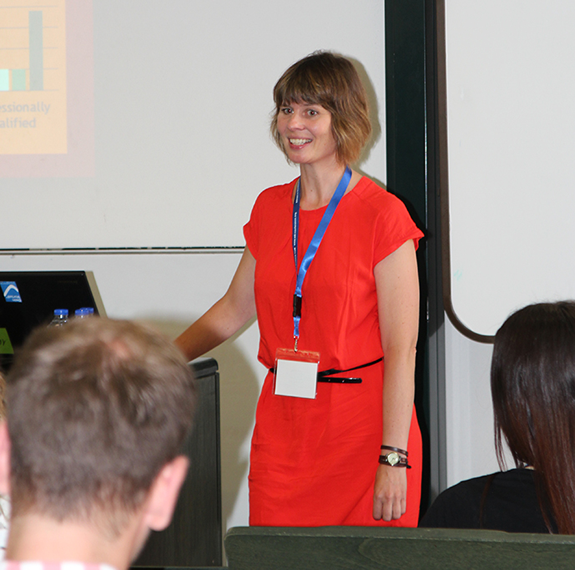Dr Meyer wins accolade in Munich for employment equity research

For a relatively–small academic unit‚ Organisational Psychology punches way out of its league‚ as a Best Paper award in Germany earlier this month attests.
Dr Ines Meyer was awarded the Best Paper Award in her stream for her presentation entitled Understanding employees’ attitudes towards employment equity from a social identity perspective at the 7th Equality‚ Diversity and Inclusion International Conference in Munich. The paper was co–authored by Ms Aleeshah Nujjoo who graduated with her Master’s degree last week – with distinction in the research dissertation. The paper was based on a new analysis of the data Ms Nujjoo had collected for her Master’s research.

The Dean of Commerce‚ Prof Don Ross‚ added that "in Commerce we all know that Dr Meyer is one of our rising star researchers. It’s gratifying to have this opinion ratified by prize jurors at a prestigious international conference."
The study explored the value of social identity theory in understanding the degree to which employees were willing to support preferential treatment of employees from demographic groups disadvantaged during apartheid.
Quantitative data was collected via surveys from 264 employees in a variety of South African organisations with the majority of participants working at management level. The results showed that‚ as expected‚ white male employees were most opposed to preferential treatment in hiring and promotion decisions. They were followed by white female‚ black female and black male employees. Interestingly‚ with the exception of black males‚ employees of all groups expressed opposition to preferential treatment. Even black male employees were merely slightly supportive of the application of employment equity principles.
The study also assessed how employees perceived the current‚ future and ideal socio–economic status of black‚ white‚ male and female South Africans. Employees expected the status differences between both‚ gender and racial groups‚ to decrease in future‚ but the way in which this was assumed to be achieved differed: The socio–economic status of male South Africans was expected to remain stable over time and that of female South Africans was expected to rise. Employees assumed that the status of black South Africans would increase‚ too‚ yet at the same time that of white South Africans would decline. Even though in South Africa’s private sector the demographic makeup of the workforce has changed just as little with regards to gender than with regards to race Ms Nujjoo and Dr Meyer assumed that the predicted loss of status for white South Africans might be part of the reason as to why the popular discourse around employment equity focuses almost exclusively on race. Overall‚ employees who perceived the current socio–economic status differences between racial groups as illegitimate and unstable were more opposed to preferential treatment than employees who perceived the system as legitimate and stable. Whether or not employees identified strongly with their gender or racial group had no effect on the results.
Ms Nujjoo and Dr Meyer concluded that employees‚ especially those from designated groups and at least at managerial level‚ seem to want to be seen promoted on merit alone. This seems particularly the case for employees who assume that status differences between white and black South Africans will attenuate in future even without employment equity policies.
The resistance towards preferential treatment from the majority of employees in managerial positions themselves‚ regardless of race and gender‚ might be one of the reasons as to why employment equity legislation has not yet led to the expected demographic transformation in the private sector. The results point to the importance of investigating further the exact reasons as to why even the majority of individuals who benefit from it are opposed to preferential treatment. This will give insights into how organisations could deal with employment equity in hiring and promotion decisions within the organisation to create not only diverse but also inclusive workplaces.
Note about the researcher:
Dr Meyer is a senior lecturer in Organisational Psychology‚ having gained her PhD at UCT in June 2005. The title of her thesis was Discrimination: Because I Want to or Because I Have to? A comparison between the explanations of Social Identity Theory and Social Dominance Theory for intergroup prejudice in South Africa. This followed her undergraduate degree and Diplom in Psychology at Philipps–University in Marburg (Germany). She worked in the non–profit sector for four years before joining UCT as an academic in 2009.
Dr Meyer is a seasoned researcher‚ with eight publications in peer–reviewed journals and eight presentations at conferences. She has held a range of leadership positions including acting head of OrgPsych‚ acting chair of the Commerce Transformation Committee and executive board member of the Global Organisation of Humanitarian Work Psychology.
Her skills are not limited to campus‚ as her expertise has been experienced more broadly. At the Khumbulani Educare Centre‚ she facilitated their strategy processes‚ at Karl Bremer Hospital she trained staff in change management‚ she led a strategy day for the City of Aachen–Cape Town partnership and ran training in Parliament on how to avoid plagiarism.
Story By : Carolyn McGibbon